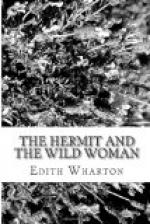In order to be near the scene of action, Garnett went to breakfast at his usual haunt, determined to despatch his business as early in the day as politeness allowed. The head waiter welcomed him to a table near that of the transatlantic sage, who sat in his customary corner, his head tilted back against the blistered mirror at an angle suggesting that in a freer civilization his feet would have sought the same level. He greeted Garnett affably and the two exchanged their usual generalizations on life till the sage rose to go; whereupon it occurred to Garnett to accompany him. His friend took the offer in good part, merely remarking that he was going to the Luxembourg gardens, where it was his invariable habit, on good days, to feed the sparrows with the remains of his breakfast roll; and Garnett replied that, as it happened, his own business lay in the same direction.
“Perhaps, by the way,” he added, “you can tell me how to find the rue Panonceaux where I must go presently. I thought I knew this quarter fairly well, but I have never heard of it.”
His companion came to a sudden halt on the narrow sidewalk, to the confusion of the dense and desultory traffic which marks the old streets of the Latin quarter. He fixed his mild eye on Garnett and gave a twist to the cigar which lingered in the corner of his mouth.
“The rue Panonceaux? It is an out of the way hole, but I can tell you how to find it,” he answered.
He made no motion to do so, however, but continued to bend on the young man the full force of his interrogative gaze; then he added abruptly: “Would you mind telling me your object in going there?”
Garnett looked at him with surprise: a question so unblushingly personal was strangely out of keeping with his friend’s usual attitude of detachment. Before he could reply, however, the other had quietly continued: “Do you happen to be in search of Samuel C. Newell?”
“Why, yes, I am,” said Garnett with a start of conjecture.
His companion uttered a sigh. “I supposed so,” he said resignedly; “and in that case,” he added, “we may as well have the matter out in the Luxembourg.”
Garnett had halted before him with deepening astonishment. “But you don’t mean to tell me—?” he stammered.
The little man made a motion of assent. “I am Samuel C. Newell,” he said drily; “and if you have no objection, I prefer not to break through my habit of feeding the sparrows. We are five minutes late as it is.”
He quickened his pace without awaiting any reply from Garnett, who walked beside him in unsubdued wonder till they reached the Luxembourg gardens, where Mr. Newell, making for one of the less frequented alleys, seated himself on a bench and drew the fragment of a roll from his pocket. His coming was evidently expected, for a shower of little dusky bodies at once descended on him, and the gravel fluttered with battling wings and beaks as he distributed his dole with impartial gestures.




